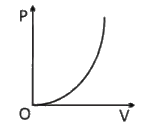A diatomic gas does 80 J of work when expanded isobarically. The heat given to the gas during this process is
700J
350J
280J
300J
The correct Answer is:C
To find the heat given to a diatomic gas during an isobaric expansion where it does 80 J of work, we can follow these steps:
Step 1: Understand the Process
In an isobaric process, the pressure remains constant while the gas expands. The work done (W) by the gas during this expansion is given as 80 J.
Step 2: Use the First Law of Thermodynamics
The First Law of Thermodynamics states:
ΔQ=ΔU+W
where:
- ΔQ is the heat added to the system,
- ΔU is the change in internal energy,
- W is the work done by the system.
Step 3: Calculate the Change in Internal Energy (ΔU)
For a diatomic ideal gas, the change in internal energy can be calculated using the formula:
ΔU=nCvΔT
For a diatomic gas, Cv=52R.
Step 4: Relate Work Done to Temperature Change
From the work done in an isobaric process:
W=PΔV=nRΔT
We can express ΔT in terms of work:
ΔT=WnR
Step 5: Substitute ΔT into ΔU
Now substituting ΔT into the equation for ΔU:
ΔU=nCvΔT=n(52R)(WnR)=52W
Given W=80J:
ΔU=52×80=200J
Step 6: Calculate Heat Added (ΔQ)
Now substituting ΔU and W back into the First Law equation:
ΔQ=ΔU+W=200J+80J=280J
Conclusion
The heat given to the gas during this process is:
ΔQ=280J
---
In an isobaric process, the pressure remains constant while the gas expands. The work done (W) by the gas during this expansion is given as 80 J.
The First Law of Thermodynamics states:
ΔQ=ΔU+W
where:
- ΔQ is the heat added to the system,
- ΔU is the change in internal energy,
- W is the work done by the system.
For a diatomic ideal gas, the change in internal energy can be calculated using the formula:
ΔU=nCvΔT
For a diatomic gas, Cv=52R.
From the work done in an isobaric process:
W=PΔV=nRΔT
We can express ΔT in terms of work:
ΔT=WnR
Now substituting ΔT into the equation for ΔU:
ΔU=nCvΔT=n(52R)(WnR)=52W
Given W=80J:
ΔU=52×80=200J
Now substituting ΔU and W back into the First Law equation:
ΔQ=ΔU+W=200J+80J=280J
The heat given to the gas during this process is:
ΔQ=280J
Topper's Solved these Questions
- BOOK - FIITJEECHAPTER - HEAT AND TEMPERATUREEXERCISE - ASSIGNMENT PROBLEMS (OBJECTIVE) (LEVEL-I) (ASSERTION AND REASON)2videos
HEAT AND TEMPERATURE
- BOOK - FIITJEECHAPTER - HEAT AND TEMPERATUREEXERCISE - ASSIGNMENT PROBLEMS (OBJECTIVE) (LEVEL II)20videos
HEAT AND TEMPERATURE
- BOOK - FIITJEECHAPTER - HEAT AND TEMPERATUREEXERCISE - ASSIGNMENT PROBLEMS (SUBJECTIVE) (LEVEL II AND III)15videos
HEAT AND TEMPERATURE
- BOOK - FIITJEECHAPTER - GRAVITATIONEXERCISE - Numerical based Question2videos
GRAVITATION
- BOOK - FIITJEECHAPTER - KINEMATICSEXERCISE - NUMERICAL BASED QUESTIONS DECIMAL TYPE5videos
KINEMATICS
Similar Questions
Knowledge Check
- Question 1 - Select One
A diatomic gas (γ = 1.4) does 300 J work when it is expanded isobarically. The heat given to the gas in this process is
A1050 J/kg KB950 JC600 JD550 J - Question 2 - Select One
A diatomic gas (γ=1.4) does 2000J of work when it is expanded isobarically. Find the heat given to the gas in the above process (in kJ).
A7000B7C5000D5 - Question 3 - Select One
A Polyatomic gas with six degrees of freedom does 25 J of work when it is expanded at constant pressure The heat given to the gas is
A100JB150JC200JD250J
A diatomic gas (γ=1.4) does 200 J of work when it is expanded isobarically. Find the heat given to the gas in the process.
View SolutionA diatomic gas (γ=1.4) does 2000J of work when it is expanded isobarically. Find the heat given to the gas in the above process (in kJ).
View SolutionA diatomic gas with rigid molecules does 10J of work when expanded at constant pressure. The heat energy absorbed by the gas, in this process is ___________ (in J).
View SolutionWhen heat in given to a gas in an isobaric process, then
View SolutionThe variation of pressure P with volume V for an ideal diatomic gas is parabolic as shown in the figure. The molar specific heat of the gas during this process is
 View Solution
View Solution

